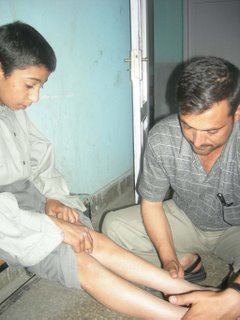About Allhoddin Orphanage and PARSA...one of the projects Dawn is working on

In January, 2006 PARSA hired two psychosocial trainers who have been certified by Dr. Patricia Omidian in a culturally specific psychosocial training that she has developed specifically for teachers who work with young children. In June 2006, I asked PARSA Director, Yasin Farid to visit neighboring Allahoddin Orphanage to see what support PARSA staff can begin to provide during our process of piloting psychosocial programs for adults and children. Yasin wrote me during my brief visit to the US to report. “I visited Allahoddin Orphanage this morning and there were some children with physical disability and lots of children with psychological problems, and there were not any physiotherapy facilities yet...the thing which they want from PARSA is that we should start physiotherapy and psychosocial program inside their school and work with children directly. Now, I made an emergency plan to do some thing for those poor children right now.. So from tomorrow one of our PT and two psychosocial trainers are going to that place and they'll start working with them…Yasin.
I have worked with Yasin for over a year now, and he is a remarkable 31-year-old Afghan who was the wage earner for his family during the war starting at 12 years old. Competent, compassionate and unflappable he is a professional now, a psychotherapist and director of our “PT” clinic. I could tell from his letter that he was shaken by the condition of the children in the orphanage. Dawn Erickson, our organizational consultant, went to the orphanage and reported the following.
“Allahoddin Orphanage has approximately 600 orphans that live at two locations. In Afghanistan a child is considered an orphan if they have no father. Some of the orphans have families that they go to see every two weeks, or once a month, but most of the orphans have no family. Many of the orphans have psychosocial problems due to the wars, being left an orphanage, not knowing if they will ever leave it, or what kind of future they have. Some of the orphans are disabled and the orphanage only provides treatment for first aid, not for disabilities. In Afghanistan, adoption is limited. Law dictates that orphans only be adopted by Muslim’s and international adoptions are very rare.” Dawn
June 2006, PARSA did an initial survey asking the teachers to find children that could be helped by physiotherapy and psychosocial care. Currently, PARSA is sending two physiotherapists and two psychosocial trainers five days a week to the orphanage for two hours to help the children with their problems. PARSA is seeking funding now to pilot a program with the teachers at Allahoddin orphanage that provides intensive services to support the orphans. PARSA will then look to replicate this program through other agencies and communities with vulnerable children.
Sair- an 8-year-old boy
“Sair’s parents left him in a container, because he has a big head and they knew that he had a problem that could not be cured. Someone found him and brought him to Allahoddin Orphanage to stay. Sair was diagnosed with hydrocephalus.
He had surgery to assist fluid flows in the body. He also has contracture in his limbs that currently, PARSA physiotherapists are helping him with through physiotherapy designed to increase his movement”. Dawn
Sair’s prognosis is poor as he lives in Afghanistan. PARSA’s staff will develop a treatment program for him that will include advocating for additional medical treatment as well as including him on our psychosocial programs designed for children.
“Ajmal does not know how long he has been living at the orphanage or how old he is.
We were asked to work with Ajmal because he demonstrates symptoms of trauma and stress. PARSA’s psychosocial trainers are starting to assess him and develop a plan for helping him.” Dawn
PARSA’s work of the next six months will be to develop simple assessment tools and strategies for treatment and to find therapeutic methods that can be integrated into school lessons, vocational training, “life skills” training, arts development, exercise and supervised play and one-on-one counseling that are culturally appropriate and effective with different age levels. Allahoddin Orphanage will also participate in a “pen pal” program connecting the children in this program with children in the US dedicated to being in touch and supporting them through the Internet.
If you are interested in this aspect of PARSA’s work please e-mail me at mgustav@mac.com. We are interested in all levels of support. For this program we are developing a volunteer program for trained professionals who are interested in contributing to program development. We are also dedicated to providing the intensive support for a pen pal exchange program for the orphans to connect them with schools in first world countries through the internet- as these programs can help children develop more advanced skills while also making them feel special through individualized contact with children of other countries.

0 Comments:
Post a Comment
Subscribe to Post Comments [Atom]
<< Home